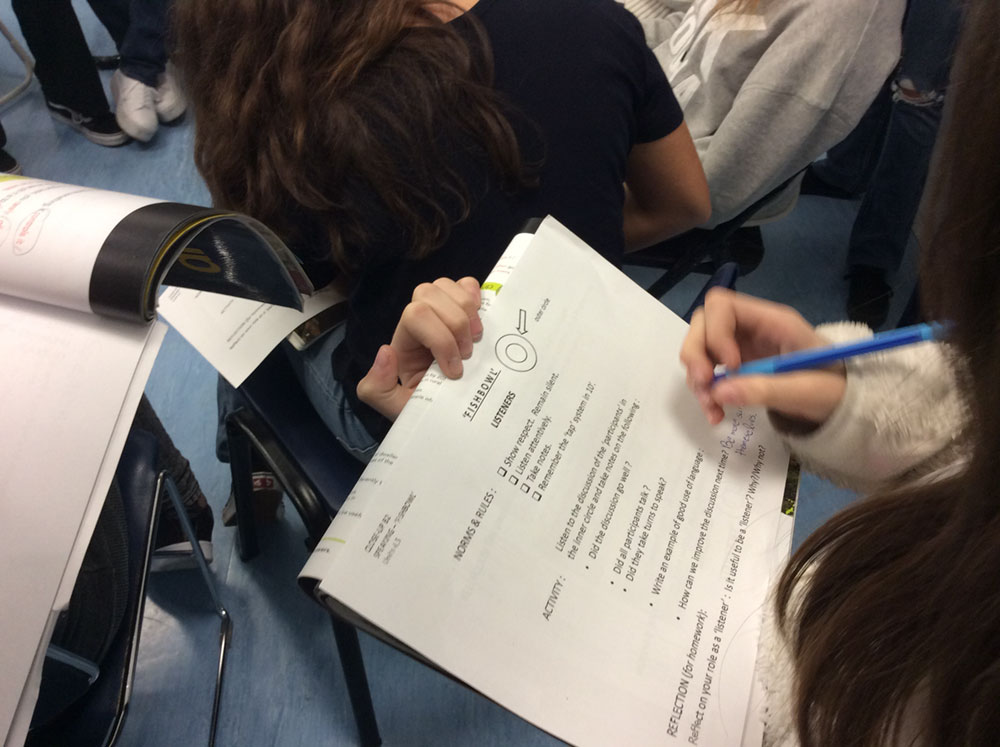Like most teachers, I use the first lesson for a ‘getting to know you’ period to establish a harmonious classroom community. There are three activities that we do at this time:
By Helen Papadopoulou, EFL Teacher
1. Play 10 questions
Before the students enter the classroom, I write five statements on the board about myself. Two of them are true; the other three are not. Students are allowed to ask 10 questions –one each.
It’s possible to revisit these statements later. For example, if students ask me if I like sport, I say “Ummm … yes and no” – and I write “Do I like sport?” on the board. When we revisit, they can drill down: to whether I like to play sport or watch sport, and when it’s established that the ‘yes’ is for playing and ‘no’ is for watching, they like to find out what sport I play.
2. Meet X
This is an activity to find out more about one classmate. Most introductory activities will be a questionnaire to “find someone who ….”
To meet X, the resources are simple: each student’s name is written on a piece of paper and placed in a container. To start the activity, I tell the students they are going to pick a piece of paper out of the container, find that person in the classroom, introduce themselves, and find out 3 interesting things about the person on the paper. They are not allowed to reciprocate … they can only share interesting facts about themselves with the person who has chosen them.
The class is then divided into groups of 3 or 4, to share the interesting things they found out about each other.
The next step is to ask the class what interesting things they’ve found out … and to share with the rest of the class. I have found myself responding to answers with “Wow!”, “Really!” and similar comments … and then I invite the student to tell us more – and no student has ever refused!
3. Setting class rules
I have to admit that I strongly object to having a list of class rules on the wall when my students are adults, or even young adults. That’s one of the reasons, I get the students to come up with their own ‘rules’.
I tell my students that throughout the course, they will be working in small teams, and I ask them one question: How would you describe a good team member? I give them a minute or so to think about it, then I ask: What do you expect of a good team member?
The class is divided into groups of three or four to brainstorm their answers and to list them on a sheet of paper. At the end of the allotted time – usually 5 minutes – all the sheets are put on the wall, and discussed as a class.
I have found (without exception) that there are a number of items which are the same across all the groups. I write these items on the board and cross them off the lists. Every item on the lists is discussed, agreed upon and written on the board. I then type up and post on the noticeboard as a gentle reminder.
At this point, I tell the class that we are a team …. and I am the team leader. I tell them that as the team leader, it is my job to teach … and team members agree to learn.
The results
Through these activities, I have shown my students that I value them as people, that their opinions matter, and that I am interested in them. I have also given them a voice – a chance to talk about the ‘classroom rules’ issue.
Students have been given a degree of autonomy to bond with each other as they think critically, express opinions and brainstorm their expectations.
By the end of the first week, I usually find 2-4 students going to breaks with each other, as they’ve formed their own teams.
At the end of the second week, I always allow 20 minutes of the last lesson for team/class meetings, where everyone – without exception – is expected to participate. By this time, everyone knows that NO opinion is wrong because ALL opinions are personal. These meetings are invaluable feedback sessions for me as students air their grievances and suggestions.
One team (rather than one person) takes notes at the meetings, which are then posted on the noticeboard. If problems are raised which the students themselves can resolve, I act as the intermediary. If problems are raised concerning the institution, I follow up and report back, after all, I am the team leader. •



